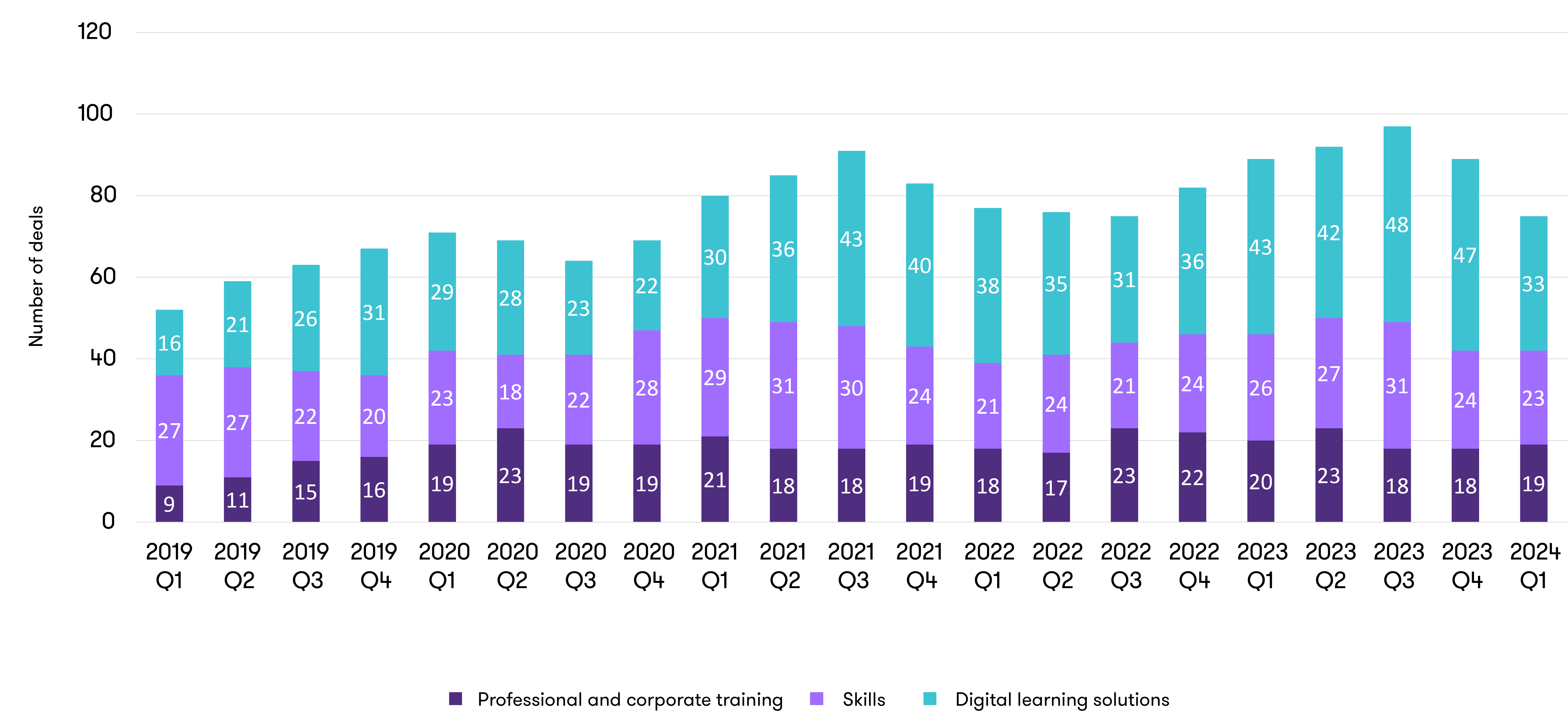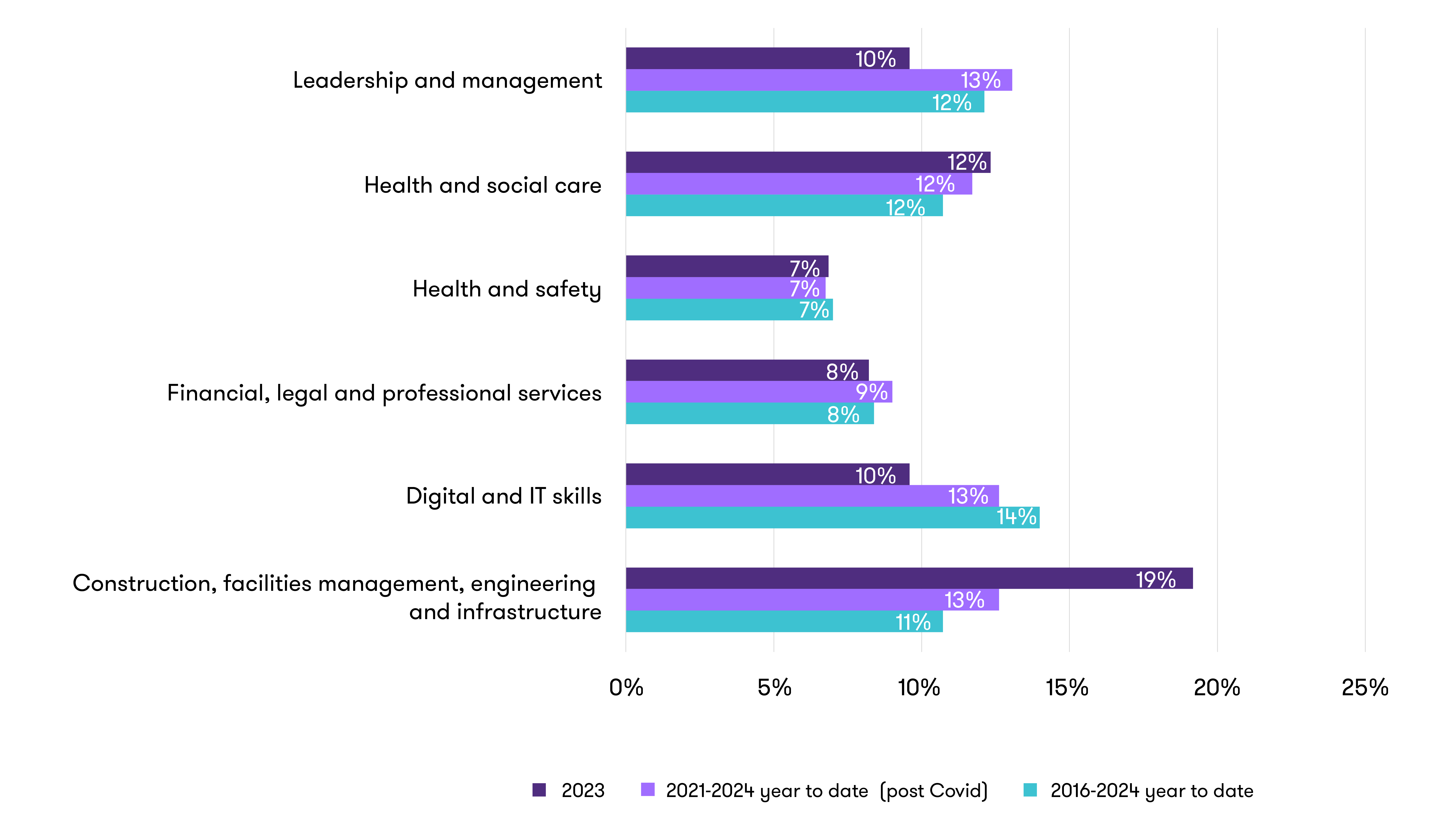Autumn Budget 2025: Expert insights on what it could mean for you. Learn more

Skills and training M&A review: Spring 2024
Recent skills and training M&A activity remains healthy despite a slight drop in rolling quarterly annual deal volumes.
There were 42 deals involving professional and corporate training businesses and skills providers in the year to the end of Q1 2024, in line with the five-year average of 43. However, deal volumes dipped in digital learning solutions.
Meanwhile, conversations with clients and investors tell us that despite the confirmation of the July general election, assessment of deals will continue given the sector is heavily intertwined with public spending. The importance of a skilled population for driving economic prosperity makes it a key staple of parties’ manifestos and campaigns. We may simply see some processes and deal timetables extend slightly.
UK skills and training - M&A deal activity
Rolling quarterly annual volume trends

Source: Grant Thornton proprietary M&A tracker, compiled from multiple sources, including M&A databases (Bureau Van Dijk Orbis M&A, Mergermarket, Capital IQ), specialist press sources (Education Investor, The Assignment Report), generalist press sources and corporate websites.
Cross-party political support for future of skills funding
Labour has been vocal about its plans to shake up the Apprenticeship Levy should it win the general election, which may force some deals into a holding pattern.
It has pledged to reform the levy so it can be spent on broader types of training, including “green skills,” such as plumbers to install heat pumps. The proposed replacement growth and skills levy would allow businesses to spend on alternative adult education courses to fill specific knowledge gaps.
This funding flexibility has prompted companies that are heavily weighted to one funding stream to explore diversifying their offering.
Separately, the Conservative Party has pledged to invest £60 million next year to pay the full cost of apprenticeships for people aged 21 or under at small firms. From April 2024, the Government also increased the amount of funding that employers paying the Apprenticeship Levy can pass to other businesses. The Government predicts these measures will enable up to 20,000 more apprenticeships.
A nation that needs to up-skill, re-skill, and new-skill
Setting aside different ideologies, the UK's two main parties have committed to policies that can only be delivered with a huge training and skills push. The need to up-skill, re-skill, and new-skill will remain regardless of the poll outcome. Focus areas include child care, health and social care, green transformation, and housebuilding.
Analysis of M&A by key end-markets shows that investors have taken note. Construction, facilities management, engineering, and infrastructure was the most popular skills and training subsector in 2023, followed by health and social care. Digital skills was the joint third-most popular category (alongside leadership and management), reflecting a need to address the skills gap related to technology transformation.
Key end markets - share of deal volumes

Source: Grant Thornton proprietary M&A tracker, compiled from multiple sources, including M&A databases (Bureau Van Dijk Orbis M&A, Mergermarket, Capital IQ), specialist press sources (Education Investor, The Assignment Report), generalist press sources and corporate websites.
Our analysis shows that deal volumes are increasingly focused on blue collar roles, a trend which will be interesting to watch throughout 2024 and 2025 with a potential change of government.
Split by type of role
 Source: Grant Thornton proprietary M&A tracker, compiled from multiple sources, including M&A databases (Bureau Van Dijk Orbis M&A, Mergermarket, Capital IQ), specialist press sources (Education Investor, The Assignment Report), generalist press sources and corporate websites.
Source: Grant Thornton proprietary M&A tracker, compiled from multiple sources, including M&A databases (Bureau Van Dijk Orbis M&A, Mergermarket, Capital IQ), specialist press sources (Education Investor, The Assignment Report), generalist press sources and corporate websites.
Health and social care
Investors are circling assets that can solve specific health and social care challenges, such as recruitment and retention. They’re also targeting businesses which can upskill healthcare workers in response to the Government’s strategy.
BBP buys Buttercups
We advised Nottingham-based Buttercups Training on its April 2024 sale to global training provider BPP Education Group (backed by TDR Capital). Buttercups delivers programmes to pharmacists, pharmacy technicians, and support staff in hospitals and primary care.
In January 2024, the Government launched Pharmacy First, a scheme that enables community pharmacies to treat seven common conditions with the aim of reducing pressure on GP surgeries.
BPP CEO Graham Gaddes said, "There is an unprecedented demand for pharmacists and pharmacy technicians in the UK, and this shortfall is set to continue to increase."
The acquisition adds to BPP's existing suite of healthcare and nursing courses for which it offers graduate and postgraduate training.
It adds to a trend of larger providers diversifying from training for professional office-based roles – such as accountancy, law, and digital marketing – into more practical vocational professions, such as healthcare.
The early years' skills gap
In the 2023 Spring Budget, the Government announced it would offer 30 hours per week of funded care for children over nine months old with working parents. The first phase started in April 2024.
It’s estimated that an additional 27,500 practitioners are needed to expand the number of free childcare hours to under-threes. In recognition of this, the Government has launched a £1,000 incentive scheme for people who take up a job in early years and childcare.
August Equity invests in Impact Futures
We advised Impact Futures on its April 2024 investment from August Equity LLP. The group is a leading provider of apprenticeships and commercial training programmes, serving customers in licence-to-practice healthcare end-markets. Delivering c.5,000 apprenticeships per year, Impact Futures provide access to high-quality vocational training, allowing learners greater access to job opportunities and facilitating career progression, further supporting the sustainability of communities over the next generation.
Kishan Chotai, Partner at August Equity, commented: At August, we have a long-standing history of investing in businesses that are providing regulatory driven, mission critical services to customers and our understanding of the health and social care and early years end markets has highlighted the important role that apprenticeships play in facilitating compliance with regulations and career progression opportunities for employees.”
This is an example of a company that would benefit from both publicly and privately funded courses in a sector that faces significant skills gaps and competition for talent.
The green skills gap
The UK is in a race to reach Net Zero by 2050, but like all other countries, it faces a green skills gap – according to The World Economic Forum, the number of green jobs has grown by 8% per year globally in the past five years, but skills haven’t kept pace. The University College of Estate Management suggests the UK has to brush up in six key areas: sustainable literacy, critical thinking, green retrofitting, digital modelling, waste management and reporting, compliance and monitoring.
Back to Work buys ECTA training
In February 2024, Palatine-backed B2W (Back to Work) acquired ECTA training (Greendale Ltd), a company that trains installers for smart meters, heat pumps, and solar panels. This marks its third deal since receiving backing from Palatine in 2020. Other investments include apprenticeship provider Just IT Training, and professional development firm BePro.
BPP announced a £5 million investment and partnership with Sustainability Unlocked
At the end of 2023 BPP Education Group backed xUnlocked and its second platform launched in 2021 to respond to the growing need for business training in sustainability.
Graham Gaddes, BPP CEO, commented, “The investment in and partnership with xUnlocked introduces a new vertical of programmes into the BPP portfolio. We are seeing an ever-increasing demand from our clients and customers who want to expand their skills in ESG and Sustainability.”
Access to debt has improved
Demand for skills and training assets is high, and the good news for buyers is that debt markets in 2024 are maintaining the signs of reopening that we saw towards the end of last year, which follows a turbulent two years of macro-risk, high inflation and consequently higher interest rates. Lender appetite has returned as borrowers are better able to demonstrate resilient trading performance and forecast with more confidence, together with positive guidance from the Bank of England as to continued falls in inflation and interest cuts beginning this summer. While we haven’t yet seen significant increases in leverage (and are unlikely to while rates remain high), more lenders have returned to the market and are seeking to deploy, which will lead to competition and an improvement in terms.
Getting ready for sale
Although demand for skills and training assets remains strong, achievement rates for learners and trainer capacity are two areas of focus.
The churn challenge
Completion rates for companies that rely on the Education and Skills Funding Agency (ESFA) for revenue are under the microscope.
Government data shows that QARs (qualification achievement rates) are around 63% for health, public services, and care training, and are at a similar level for business administration and law, driven by higher churn in certain sectors.
Training the trainers
Demonstrating a growing demand for training services is the easy bit. The challenge is delivery: training companies must demonstrate that they have enough trainers to meet the demand.
The expansion of quality online training during COVID-19 solved this problem for some providers. However, training for practical professions, such as nursing or solar panel installation, requires some in-person contact.
In a reputation-driven industry, training firms need to grow contracts responsibly. This means maintaining a clear recruitment pipeline and training for their own trainers.
Demand will continue to underpin skills and training M&A throughout 2024
The February edition of our business outlook tracker, a bimonthly survey of 600 mid-sized business leaders, showed that 45% of businesses expect to increase their investment in skills development in the next six months.
Such demand is clearly here to stay, and we anticipate a flurry of deals when the general election gives skills and training businesses the clarity to adjust to funding changes or continue business as usual.
For more insight and guidance, get in touch with Victoria Giles or Carl Parker.
![]()
Get in touch with our experts

